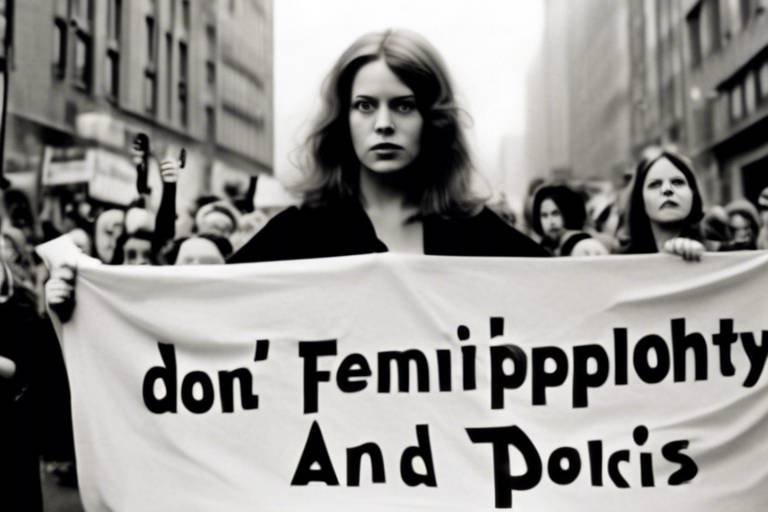Feminist Philosophy and its Political Implications
Feminist philosophy is not just an academic exercise; it’s a vibrant and dynamic field that seeks to address the inequalities and injustices faced by women and marginalized groups. It challenges the status quo, questions traditional philosophical frameworks, and pushes for a more inclusive understanding of human experience. At its core, feminist philosophy is about empowerment, equality, and justice. It aims to dismantle the systemic barriers that have historically oppressed women and other marginalized communities, making it a crucial player in the political arena.
In today's society, the implications of feminist thought can be seen in various aspects of life, from grassroots activism to high-level policy-making. Feminist philosophers argue that understanding the political ramifications of their ideas is essential for driving real change. This article aims to explore how feminist philosophy influences contemporary issues, including social justice movements, policy initiatives, and the ongoing fight for equality.
Feminist philosophy has roots that run deep in historical contexts, shaped by key thinkers who have paved the way for modern discussions. The evolution of this philosophy reflects the changing landscape of society and the pressing need for a more nuanced understanding of gender, power dynamics, and social structures. As we delve deeper into the foundations of feminist thought, we uncover a rich tapestry of ideas that challenge conventional wisdom and advocate for a more equitable world.
Moreover, the political implications of feminist philosophy extend beyond mere theory; they manifest in tangible actions and movements that seek to transform society. By integrating feminist principles into policy-making processes, advocates aim to create laws that are not only fair but also responsive to the needs of marginalized groups. This integration is essential for addressing issues such as reproductive rights, equal pay, and domestic violence, ensuring that the voices of women and other marginalized individuals are heard and respected.
In essence, feminist philosophy provides a framework for understanding the complexities of social justice and equality. It encourages critical thinking about the structures that govern our lives and inspires action towards creating a more just society. As we navigate the political landscape, the insights drawn from feminist thought will continue to play a vital role in shaping our collective future.
- What is feminist philosophy? Feminist philosophy is a branch of philosophy that examines the ways in which gender, power, and social structures intersect, advocating for equality and justice for women and marginalized groups.
- How does feminist philosophy influence politics? Feminist philosophy influences politics by informing policies that address gender inequalities, promoting social justice movements, and challenging traditional power dynamics.
- What are the key concepts in feminist philosophy? Key concepts include gender, power, intersectionality, and feminist ethics, all of which challenge traditional philosophical frameworks and promote inclusivity.
- Why is intersectionality important in feminist philosophy? Intersectionality is crucial because it examines how various social identities, such as race and class, intersect to create unique experiences of oppression and privilege.
- What challenges does feminist philosophy face today? Feminist philosophy faces challenges such as backlash from traditionalist views, the need for ongoing dialogue about inclusivity, and internal critiques that push for more diverse perspectives.

Historical Context of Feminist Philosophy
To truly appreciate the richness of feminist philosophy, it's essential to delve into its historical context. This philosophy didn't just pop up overnight; it has roots that stretch back through centuries of thought and activism. The journey of feminist philosophy begins with the early suffragists and extends to contemporary thinkers who challenge societal norms. Think of it as a tapestry woven from the threads of social justice, political activism, and philosophical inquiry.
In the 18th and 19th centuries, the seeds of feminist thought were planted by pioneering figures such as Mary Wollstonecraft, whose work "A Vindication of the Rights of Woman" laid the groundwork for future feminist discourse. Wollstonecraft argued vehemently for women's education and rationality, challenging the prevailing notions of female inferiority. Her ideas sparked conversations that would echo through the ages, influencing generations of women and men alike.
As we move into the 20th century, the feminist movement gained momentum, particularly during the 1960s and 1970s. This era saw the rise of second-wave feminism, characterized by a broader focus on issues such as reproductive rights, workplace equality, and sexual liberation. Think of it as a powerful wave crashing against the rocky shores of patriarchy, reshaping the landscape of social norms. Influential thinkers like Simone de Beauvoir and Betty Friedan brought attention to the existential struggles faced by women, pushing for a reevaluation of gender roles.
The historical context of feminist philosophy is not just a linear progression; it is a complex web of influences and interactions. For instance, the intersection of feminism with other social movements, such as civil rights and LGBTQ+ rights, has enriched its discourse. Each wave of feminism has brought new insights and challenges, making the conversation about gender more nuanced and inclusive.
To illustrate the evolution of feminist thought, consider the following table that highlights key milestones:
| Year | Milestone | Key Figure |
|---|---|---|
| 1792 | Publication of "A Vindication of the Rights of Woman" | Mary Wollstonecraft |
| 1963 | Release of "The Feminine Mystique" | Betty Friedan |
| 1970 | Formation of the National Organization for Women (NOW) | Various activists |
| 1990s | Emergence of third-wave feminism | Rebecca Walker |
As we reflect on these historical milestones, it's clear that feminist philosophy has been shaped by a diverse array of voices and experiences. The interplay between various social movements has enriched feminist discourse, allowing it to adapt and respond to new challenges. This historical lens not only highlights the struggles and triumphs of feminist thinkers but also sets the stage for the ongoing evolution of feminist philosophy in our contemporary society.
In conclusion, the historical context of feminist philosophy is a testament to its resilience and adaptability. It serves as a reminder that the fight for gender equality is not just a modern concern but a long-standing struggle that continues to evolve. Understanding this context is crucial for anyone looking to engage meaningfully with feminist thought today.
- What is feminist philosophy? Feminist philosophy examines the ways in which gender influences our understanding of knowledge, ethics, and social justice.
- Who are some key figures in feminist philosophy? Notable figures include Mary Wollstonecraft, Simone de Beauvoir, and Judith Butler, each contributing unique perspectives to feminist thought.
- How has feminist philosophy evolved over time? It has evolved through various waves, each addressing different issues such as suffrage, reproductive rights, and intersectionality.

Key Concepts in Feminist Thought
Feminist philosophy is a vibrant and dynamic field that seeks to challenge traditional philosophical frameworks while promoting a more inclusive understanding of human experience. At its core, feminist thought revolves around several key concepts that interrogate the very foundations of gender, power, and equality. These concepts not only critique existing structures but also advocate for transformative change in society. One of the most pivotal ideas in feminist philosophy is the concept of gender.
Gender is not merely a binary classification of male and female; rather, it is understood as a complex social construct that shapes our identities and experiences. Feminist philosophers argue that societal norms dictate how individuals should behave based on their gender, often leading to systemic inequalities. This understanding of gender encourages a critical examination of how these roles are constructed and perpetuated, urging individuals to question the status quo.
Another fundamental concept is power. Feminist thinkers assert that power dynamics are central to understanding social relations and injustices. Power manifests in various forms, from institutional to interpersonal, and often operates in ways that marginalize certain groups, particularly women and other underrepresented identities. By analyzing how power is distributed and exercised, feminist philosophy aims to uncover the mechanisms of oppression and advocate for a more equitable distribution of power.
In addition to gender and power, the notion of equality is a cornerstone of feminist thought. Feminists argue that equality is not simply about equal treatment under the law but encompasses broader social, economic, and cultural dimensions. This perspective calls for policies and practices that address the historical and systemic disadvantages faced by women and marginalized communities. Achieving true equality requires an intersectional approach that recognizes how various identities—such as race, class, and sexuality—interact to shape individual experiences.
One of the most significant contributions of feminist philosophy is the concept of intersectionality. Coined by legal scholar Kimberlé Crenshaw, intersectionality examines how different social identities intersect and influence experiences of oppression and privilege. It acknowledges that individuals do not experience discrimination or privilege in isolation; rather, their experiences are shaped by the interplay of multiple identities.
For instance, the experiences of a Black woman cannot be fully understood by analyzing her race or gender alone. Instead, it is essential to consider how these identities interact, creating unique challenges and opportunities. This nuanced understanding is crucial for developing feminist discourse that is truly inclusive and representative of diverse experiences.
The intersection of race and gender plays a critical role in shaping individual experiences and highlights the need for inclusive approaches in feminist discourse. Women of color often face compounded discrimination, which can manifest in various ways, from economic disparities to social stigmas. By addressing these intersections, feminist philosophy can advocate for policies that are sensitive to the unique challenges faced by women of different racial backgrounds.
Another vital intersection is that of class and feminism. Economic status significantly impacts women's rights and opportunities across different societies. Feminist philosophy emphasizes the importance of understanding how class dynamics influence access to resources, education, and healthcare. By integrating class analysis into feminist discourse, advocates can better address the needs of women from lower socioeconomic backgrounds, ensuring that the fight for equality is comprehensive and far-reaching.
In conclusion, the key concepts in feminist thought—gender, power, equality, and intersectionality—are pivotal in challenging traditional philosophical frameworks and promoting a more inclusive understanding of human experience. As feminist philosophy continues to evolve, these concepts will remain central to its discourse, driving social change and advocating for justice and equality for all.
- What is feminist philosophy? Feminist philosophy is a branch of philosophy that examines the ways in which gender influences our understanding of knowledge, reality, and ethics, while advocating for the rights and experiences of women and marginalized groups.
- Why is intersectionality important in feminist thought? Intersectionality is crucial because it recognizes that individuals have multiple identities that intersect, influencing their experiences of oppression and privilege. This understanding promotes a more inclusive and comprehensive approach to feminism.
- How does feminist philosophy influence social movements? Feminist philosophy informs social movements by providing a framework for understanding systemic inequalities and advocating for policies that promote gender equality and social justice.

Intersectionality
When we talk about , we're diving into a rich tapestry of identities and experiences that shape our lives. Coined by legal scholar Kimberlé Crenshaw in the late 1980s, intersectionality is a lens for understanding how various social identities—like race, gender, class, sexual orientation, and more—interact and overlap. Imagine a Venn diagram where circles representing different identities intersect; the overlapping areas reveal unique experiences of oppression or privilege that can't be understood by looking at each identity in isolation.
This concept is crucial in feminist philosophy because it challenges the notion that all women experience oppression in the same way. For instance, a white woman may face sexism, but her experience is different from that of a Black woman who must navigate both racism and sexism. In this light, feminist discourse must evolve to include voices from all walks of life, recognizing that the fight for gender equality is intricately linked to other social justice movements.
Furthermore, intersectionality emphasizes that the impacts of systemic inequalities are not only cumulative but also interconnected. For example, a woman from a low-income background may face barriers to education that are compounded by her gender and race. This intersection of race, gender, and class creates a unique set of challenges that require nuanced solutions. To illustrate, consider the following table that showcases different social identities and their potential intersections:
| Social Identity | Potential Challenges |
|---|---|
| Race | Discrimination, systemic racism |
| Gender | Sexism, gender-based violence |
| Class | Poverty, lack of access to resources |
| Sexual Orientation | Homophobia, discrimination |
| Disability | Inaccessibility, marginalization |
As we can see, the intersection of these identities leads to a complex web of challenges that cannot be addressed through a one-size-fits-all approach. Feminist philosophy must therefore advocate for a more inclusive framework that recognizes these complexities. This means that when we fight for women's rights, we must also consider how race, class, and other factors influence women's experiences and the barriers they face.
In conclusion, intersectionality is not just an academic concept; it is a vital tool for understanding the multifaceted nature of oppression and privilege in our society. By embracing this framework, feminist philosophy can evolve to be more inclusive and effective in addressing the needs of all women, particularly those at the intersections of multiple marginalized identities. This approach not only enriches feminist discourse but also strengthens the broader movement for social justice.

Race and Gender
When we dive into the intricate web of race and gender, we uncover a rich tapestry of experiences that shape individual identities and societal interactions. These two elements are not just separate threads; they intertwine to create unique challenges and privileges, influencing how individuals navigate the world. Imagine a fabric where each thread represents a different aspect of identity—when you pull on one, the others shift and change, revealing the complexity of social dynamics.
Historically, discussions around gender have often overlooked the profound impact of race. Women of color face a distinct set of challenges that white women may not encounter, making it essential to consider both race and gender in feminist discourse. For instance, the experiences of a Black woman in America cannot be fully understood without acknowledging the intersections of racism and sexism that shape her reality. This intersectionality highlights that the fight for gender equality cannot be separated from the fight against racial injustice.
To illustrate this point, let’s consider a few key aspects:
- Access to Opportunities: Women of color often face systemic barriers that limit their access to education and employment. These barriers are deeply rooted in historical inequalities and continue to affect their socioeconomic status.
- Representation: In many spheres, including politics and media, women of color are significantly underrepresented. This lack of visibility perpetuates stereotypes and marginalizes their voices in crucial conversations.
- Health Disparities: The intersection of race and gender also manifests in health outcomes. Women of color frequently encounter disparities in healthcare access and quality, leading to poorer health outcomes compared to their white counterparts.
Understanding the intersection of race and gender is not just an academic exercise; it has real-world implications. Activists and scholars alike emphasize the importance of an inclusive feminist movement that recognizes and addresses these intersections. By doing so, we can create a more equitable society where all women, regardless of their racial background, can thrive.
In conclusion, the dialogue surrounding race and gender is essential for advancing feminist philosophy. As we continue to explore these intersections, we must remain committed to amplifying the voices of those who have been historically marginalized. Only then can we hope to build a feminist movement that truly represents and serves all women.
- What is intersectionality? Intersectionality is a concept that examines how various social identities, such as race, gender, class, and sexuality, intersect and influence experiences of oppression and privilege.
- How does race impact feminist movements? Race impacts feminist movements by highlighting the unique challenges faced by women of color, which often differ from those faced by white women. This necessitates a more inclusive approach to feminism.
- Why is representation important in discussions about race and gender? Representation is vital because it ensures diverse perspectives are included in conversations about race and gender, helping to challenge stereotypes and promote understanding.

Class and Feminism
Class and feminism are intricately linked, revealing how economic status can profoundly shape women's experiences and opportunities. When we talk about feminism, it’s essential to remember that not all women experience oppression in the same way. The intersection of class with gender creates a unique set of challenges that must be addressed within feminist discourse. For instance, a woman from a low-income background may face barriers in accessing education, healthcare, and employment that a woman from a wealthier class may not even consider. This disparity highlights the need for a more nuanced understanding of feminism that goes beyond the notion of gender alone.
Moreover, the feminist movement has often been critiqued for its tendency to center the experiences of middle-class white women, inadvertently sidelining the voices of women from diverse socio-economic backgrounds. This oversight can lead to policies and advocacy efforts that do not fully address the needs of all women. For example, a feminist approach that fails to consider economic inequality may overlook how issues like affordable childcare, living wages, and access to social services are crucial for empowering women across different classes.
To illustrate the impact of class on feminist issues, consider the following points:
- Access to Resources: Women from lower socio-economic backgrounds often struggle to access resources that support their empowerment, such as education and healthcare.
- Workplace Inequality: Class disparities can lead to differences in job opportunities, with lower-income women frequently facing exploitation and discrimination in the workplace.
- Social Safety Nets: Economic status influences the availability of social safety nets, which can either support or hinder women's ability to thrive.
In recognizing these complexities, feminist philosophy must strive to be more inclusive, advocating for policies that address class disparities while promoting gender equality. This means not only amplifying the voices of marginalized women but also creating frameworks that understand and dismantle the systemic barriers they face. The fight for women's rights cannot be divorced from the fight against economic inequality; they are two sides of the same coin.
1. How does class affect women's rights?
Class affects women's rights by influencing their access to education, healthcare, and employment opportunities. Women from lower socio-economic backgrounds often face greater challenges in achieving equality.
2. Why is intersectionality important in feminism?
Intersectionality is crucial because it helps us understand how various social identities, such as race, class, and gender, intersect to create unique experiences of oppression and privilege.
3. What can be done to address class disparities in feminism?
To address class disparities in feminism, it is essential to promote inclusive policies, amplify marginalized voices, and ensure that the feminist movement considers the diverse experiences of all women.

Feminist Ethics
Feminist ethics is a transformative approach that challenges traditional ethical theories, which often prioritize abstract principles over the complexities of human relationships. At its core, feminist ethics emphasizes the significance of context, care, and the interconnectedness of individuals in moral decision-making. It invites us to reconsider what it means to be ethical in a world where relationships matter deeply and where the experiences of marginalized groups often go unrecognized.
One of the key tenets of feminist ethics is the recognition that ethical dilemmas cannot be understood in isolation. Instead, they are embedded within social contexts that shape our experiences and values. For instance, when addressing issues like reproductive rights or domestic violence, feminist ethics urges us to consider not just the legal implications but also the emotional and relational aspects that affect women's lives. This perspective highlights the importance of empathy and understanding in moral reasoning, moving away from a one-size-fits-all approach.
Furthermore, feminist ethics critiques the dominant ethical frameworks, such as utilitarianism and deontology, which often overlook the lived experiences of women and other marginalized groups. By advocating for a more inclusive ethical discourse, feminist ethics seeks to amplify voices that have been historically silenced. It challenges us to ask questions like: How do power dynamics influence our moral judgments? Are we considering the needs of those who are most vulnerable in our ethical considerations?
In practical terms, feminist ethics can manifest in various ways, including:
- Care Ethics: This approach prioritizes relationships and the responsibilities we have to one another, particularly in caregiving roles.
- Relational Autonomy: This concept emphasizes that individual autonomy is often shaped by social relationships and contexts, advocating for a more nuanced understanding of freedom.
- Contextual Morality: Feminist ethics encourages us to consider the specific circumstances surrounding ethical dilemmas, rather than applying universal rules.
By integrating these principles, feminist ethics not only enriches our understanding of morality but also provides a framework for addressing social justice issues. It empowers individuals to engage in ethical reflection that is not only personal but also collective, fostering a sense of responsibility towards one another. In a world that is increasingly interconnected, the insights from feminist ethics are more relevant than ever, urging us to build a more compassionate and just society.
- What is feminist ethics? Feminist ethics is an approach to ethics that emphasizes the importance of relationships, care, and context in moral decision-making, challenging traditional ethical theories.
- How does feminist ethics differ from traditional ethics? Unlike traditional ethical theories that often prioritize abstract principles, feminist ethics focuses on the complexities of human relationships and the experiences of marginalized groups.
- Why is context important in feminist ethics? Context is crucial because ethical dilemmas are influenced by social, cultural, and relational factors, which must be considered to fully understand moral issues.
- What are some key concepts in feminist ethics? Key concepts include care ethics, relational autonomy, and contextual morality, all of which emphasize the significance of relationships and the specific circumstances surrounding ethical dilemmas.

Political Ramifications of Feminist Philosophy
Feminist philosophy is not just an academic exercise; it has profound political implications that ripple through every layer of society. By questioning established norms and advocating for equality, feminist thought has reshaped how we view policies, activism, and social justice movements. At its core, feminist philosophy challenges the traditional power structures that have long dictated the status quo, pushing for a more inclusive and equitable society.
One of the most significant impacts of feminist philosophy is its role in policy-making. Feminist thinkers argue that many laws and regulations have historically been crafted without considering women's experiences and needs. By integrating feminist principles into policy discussions, lawmakers can create legislation that addresses the unique challenges faced by women and marginalized groups. This can lead to transformative changes in areas such as reproductive rights, workplace equality, and domestic violence prevention. For instance, consider the following table that outlines some key areas where feminist philosophy has influenced policy:
| Policy Area | Feminist Influence | Impact |
|---|---|---|
| Reproductive Rights | Advocacy for bodily autonomy | Increased access to healthcare and reproductive services |
| Workplace Equality | Promotion of equal pay and anti-discrimination laws | Reduction in the gender pay gap |
| Domestic Violence | Legislation focused on victim support and prevention | Enhanced legal protections for survivors |
Moreover, feminist philosophy fuels grassroots activism. Feminists have been at the forefront of social movements, mobilizing communities to challenge systemic inequalities. From the suffragette movement to contemporary protests against sexual harassment, feminist philosophy has provided a framework for understanding and addressing injustices. Activists often rely on feminist principles to guide their strategies, emphasizing the importance of intersectionality and inclusivity in their efforts.
In today’s political climate, the integration of feminist thought into activism is more crucial than ever. With rising awareness of issues such as gender-based violence, reproductive rights, and economic inequality, feminist activists are not only advocating for change but are also influencing public opinion and policy decisions. Their voices are essential in shaping a future that values diversity and equity.
However, the journey is not without its challenges. Feminist philosophy often faces resistance from traditionalist views that seek to maintain established power dynamics. This backlash can manifest in various ways, from legislative pushback against women's rights to societal attempts to undermine feminist discourse. Nevertheless, the resilience of feminist thought continues to inspire new generations of activists and thinkers who are committed to fostering a more just society.
In conclusion, the political ramifications of feminist philosophy are vast and multifaceted. By challenging existing power structures and advocating for the rights of marginalized groups, feminist thought not only influences policy-making but also energizes social movements. As we move forward, it is essential to recognize the ongoing relevance of feminist philosophy in shaping a world where equality and justice are not just ideals but realities.
- What is feminist philosophy? Feminist philosophy examines the ways in which gender influences our understanding of knowledge, reality, and ethics, advocating for equality and social justice.
- How does feminist philosophy influence policy-making? By integrating feminist principles into law and policy discussions, feminist philosophy ensures that the needs of women and marginalized groups are considered in legislative processes.
- What role does activism play in feminist philosophy? Activism is a vital expression of feminist philosophy, mobilizing communities to challenge systemic injustices and advocate for social change.
- What are some challenges faced by feminist philosophy today? Feminist philosophy often encounters resistance from traditionalist views and must continually adapt to ensure inclusivity and representation within its discourse.

Feminism and Social Movements
Feminism has been a driving force behind numerous social movements, acting as a catalyst for change and empowerment across different societies. From the suffragette movement in the early 20th century to contemporary campaigns like #MeToo and Time's Up, feminist philosophy has provided a framework for challenging systemic inequalities and advocating for women's rights. These movements are not just about women; they encompass a broader fight for social justice, equality, and the dismantling of oppressive structures that affect marginalized groups.
At the heart of these social movements lies the understanding that collective action is essential for creating meaningful change. Feminism encourages individuals to come together, share their experiences, and amplify their voices in the pursuit of justice. This is evident in the way grassroots organizations have mobilized communities to address issues such as domestic violence, reproductive rights, and workplace discrimination. These movements often employ various strategies, including protests, awareness campaigns, and lobbying efforts, to draw attention to their causes and push for policy changes.
One of the most significant aspects of feminist movements is their ability to adapt and respond to the changing political landscape. For instance, the rise of digital activism has transformed how feminists organize and communicate. Social media platforms have become vital tools for spreading awareness and connecting activists globally. Hashtags like #BlackLivesMatter and #SayHerName have illustrated how intersectional feminism can address the unique challenges faced by women of color, emphasizing the need for an inclusive approach that recognizes the interconnectedness of race, gender, and class.
Furthermore, feminist social movements often collaborate with other movements, such as those advocating for LGBTQ+ rights, environmental justice, and anti-racism. This intersectional approach not only broadens the scope of feminist activism but also fosters solidarity among diverse groups fighting against oppression. By recognizing the shared struggles of various communities, feminists can create a more unified front against systemic injustices.
In conclusion, feminism is not just a theoretical framework; it is a powerful movement that has shaped social progress throughout history. Its influence on social movements has been profound, driving change and inspiring individuals to stand up for their rights and the rights of others. As we look to the future, the continued evolution of feminist thought will undoubtedly play a crucial role in shaping the landscape of social justice and equality.
- What is the main goal of feminist social movements?
Feminist social movements aim to achieve gender equality, challenge systemic oppression, and advocate for the rights of women and marginalized groups. - How do feminist movements address intersectionality?
Feminist movements recognize that individuals experience oppression differently based on their intersecting identities, such as race, class, and sexual orientation, and strive to include diverse perspectives in their activism. - What role does digital activism play in feminism today?
Digital activism allows feminists to organize, communicate, and mobilize more effectively, reaching a global audience and amplifying their messages through social media platforms.

Feminism in Policy Making
Feminism plays a pivotal role in shaping policy-making processes, advocating for laws and regulations that not only address gender inequality but also promote the rights of marginalized groups. The integration of feminist principles into policy is not merely an act of goodwill; it is a necessity for creating a society that values equity and justice for all individuals. By prioritizing the voices of women and other underrepresented communities, feminist policy-making seeks to dismantle systemic barriers that perpetuate discrimination and inequality.
One of the essential aspects of feminist policy-making is its focus on intersectionality. This concept recognizes that individuals have multiple identities that intersect, such as race, gender, class, and sexuality, which can influence their experiences and access to resources. For example, a policy that addresses women's health must also consider how race and economic status affect healthcare access. By incorporating an intersectional lens, feminist policies can better serve diverse populations and ensure that no one is left behind.
Moreover, feminist policy-making often involves grassroots activism, where community members actively participate in shaping the laws that govern their lives. This bottom-up approach empowers individuals and fosters a sense of ownership over the political process. In many cases, successful feminist policies have emerged from the collective efforts of activists who have rallied for change, highlighting the importance of public engagement in policy discussions. For instance, movements advocating for paid family leave and reproductive rights have gained momentum through grassroots efforts, leading to significant legislative changes in various regions.
To illustrate the impact of feminist policies, consider the following table that showcases key areas where feminist principles have influenced policy-making:
| Policy Area | Feminist Influence | Outcome |
|---|---|---|
| Reproductive Rights | Advocacy for access to contraception and abortion services | Increased legal protections and access to reproductive healthcare |
| Workplace Equality | Promotion of equal pay and anti-discrimination laws | Stronger enforcement of equal pay legislation |
| Family Leave Policies | Campaigns for paid family leave and childcare support | Implementation of paid family leave in several states |
Despite the progress made, challenges remain in the realm of feminist policy-making. Resistance from traditionalist views often creates obstacles to the acceptance and implementation of feminist ideas in mainstream discourse. However, the ongoing dialogue about inclusivity and representation within feminist circles continues to push for more comprehensive approaches to policy that consider the diverse experiences of all individuals.
In conclusion, feminism in policy-making is not just about advocating for women; it's about creating a framework that ensures fairness and justice for everyone. As we move forward, it is essential to keep the dialogue open, engage with diverse perspectives, and strive for policies that reflect the needs of all members of society.
- What is feminist policy-making?
Feminist policy-making refers to the process of creating laws and regulations that prioritize gender equality and the rights of marginalized groups, often incorporating an intersectional approach.
- How does intersectionality influence feminist policies?
Intersectionality allows policymakers to understand how various identities intersect and affect individuals' experiences, leading to more inclusive and effective policies.
- Why is grassroots activism important in feminist policy-making?
Grassroots activism empowers communities to engage in the political process, ensuring that the needs and voices of diverse populations are represented in policy discussions.

Challenges to Feminist Philosophy
Despite the significant strides made by feminist philosophy over the years, it faces a multitude of challenges that threaten its progress and relevance. One of the most pressing issues is the backlash from traditionalist perspectives, which often seek to undermine feminist ideas and principles. This resistance can manifest in various forms, from political opposition to cultural pushback, creating a hostile environment for feminist discourse. The tension between traditional views and feminist thought can be likened to a tug-of-war, where progress is constantly at risk of being pulled back by deeply ingrained societal norms.
Moreover, the need for ongoing dialogue about inclusivity and representation within feminist discourse is crucial. Feminism is not a monolith; it encompasses a range of perspectives and experiences. Yet, there are often critiques about whose voices are amplified and whose are marginalized. For instance, discussions around race, class, and sexuality can sometimes lead to divisions within the feminist movement itself. It's essential to recognize that feminism's strength lies in its diversity, and internal critiques can serve as a catalyst for growth and evolution. This can be illustrated through the concept of intersectionality, which emphasizes the interconnectedness of social identities and the unique experiences that arise from them.
To address these challenges, feminist philosophy must embrace a more inclusive framework that considers the diverse perspectives of all women and marginalized groups. This means actively engaging with critiques from within and ensuring that feminist discourse is not dominated by a singular narrative. For example, feminist thinkers are increasingly recognizing the importance of incorporating voices from different cultural backgrounds, socioeconomic statuses, and life experiences. By doing so, feminist philosophy can better reflect the complexities of women's lives and the multifaceted nature of oppression.
Additionally, external resistance from traditionalist views presents a significant barrier to the acceptance and implementation of feminist ideas in mainstream discourse. This resistance can often be rooted in fear of change or a desire to maintain the status quo. For instance, policies aimed at promoting gender equality may face opposition from those who believe that such measures threaten their own privileges or societal structures. This creates a challenging landscape for feminists who advocate for systemic change, as they must navigate not only the complexities of their own movement but also the entrenched ideologies that seek to counteract their efforts.
In light of these challenges, it is imperative for feminist philosophy to remain adaptable and resilient. Engaging in constructive dialogues, fostering inclusivity, and addressing critiques head-on can empower the movement to evolve and thrive. The future of feminist philosophy depends on its ability to confront these challenges with courage and creativity, ensuring that it remains a powerful force for social justice and equality.
- What are the main challenges faced by feminist philosophy today?
Feminist philosophy faces backlash from traditionalist perspectives, challenges of inclusivity, and the need for ongoing dialogue about diverse experiences within the movement.
- How does intersectionality relate to feminist philosophy?
Intersectionality is a key concept that examines how various social identities intersect, influencing experiences of oppression and privilege in complex ways.
- Why is inclusivity important in feminist discourse?
Inclusivity ensures that a range of perspectives are considered, allowing feminist philosophy to reflect the complexities of women's lives and the multifaceted nature of oppression.

Critiques from Within
Feminist philosophy is not a monolithic entity; it is a vibrant tapestry woven from diverse threads of thought, experience, and critique. Within this rich landscape, internal critiques serve as vital mechanisms for reflection and growth. These critiques often emerge from various factions within the feminist movement, challenging established norms and pushing for a more inclusive framework that embraces the multiplicity of women's experiences. For instance, some feminists argue that traditional feminist discourse has predominantly centered on the experiences of white, middle-class women, thereby neglecting the voices of women of color, LGBTQ+ individuals, and those from lower socio-economic backgrounds.
Such critiques highlight the necessity of intersectionality in feminist thought, urging the movement to consider how factors like race, class, sexuality, and ability intersect to shape unique experiences of oppression and privilege. This call for inclusivity is not merely a critique but a roadmap for future feminist endeavors. By addressing these gaps, feminist philosophy can evolve into a more comprehensive and representative framework. Moreover, the emphasis on intersectionality invites a broader dialogue about the complexities of identity, encouraging feminists to engage with issues that may have previously been sidelined.
Another significant critique revolves around the concept of essentialism—the idea that there are inherent traits or characteristics that define what it means to be a woman. Many feminists argue that such a viewpoint risks oversimplifying the diverse realities of women's lives. They contend that essentialist notions can inadvertently reinforce stereotypes and limit the understanding of gender as a fluid and socially constructed category. This critique pushes for a more nuanced understanding of gender that recognizes the spectrum of identities and experiences that exist beyond binary classifications.
Furthermore, the rise of postmodern feminism has introduced another layer of critique, questioning the very foundations of feminist theory itself. Postmodern feminists challenge the idea of a singular feminist narrative, advocating instead for a multiplicity of voices and experiences. They argue that no single theory can encapsulate the vast array of women's experiences across different cultures and contexts. This perspective encourages ongoing dialogue and the deconstruction of traditional feminist ideologies, fostering an environment where diverse viewpoints can coexist and be valued.
In essence, critiques from within feminist philosophy are not merely dissenting voices; they are essential to the movement's vitality and relevance. By embracing these critiques, feminist thought can continue to adapt and respond to the changing landscape of social justice, ensuring that it remains a powerful force for equality and justice for all women. As we navigate the complexities of identity and oppression, these internal dialogues will pave the way for a more inclusive and effective feminist movement.
- What is feminist philosophy?
Feminist philosophy is a branch of philosophy that examines the ways in which gender influences our understanding of knowledge, ethics, and social justice. It seeks to challenge traditional philosophical frameworks that have historically marginalized women's experiences and perspectives.
- Why is intersectionality important in feminist thought?
Intersectionality is crucial because it recognizes that individuals experience overlapping systems of oppression and privilege. By considering factors such as race, class, and sexuality, feminist philosophy can address the unique challenges faced by different groups of women.
- How do internal critiques strengthen feminist philosophy?
Internal critiques encourage reflection and adaptability within the feminist movement. They highlight gaps in representation and understanding, pushing for a more inclusive approach that acknowledges the diverse experiences of all women.
- What role does essentialism play in feminist discourse?
Essentialism refers to the idea that there are inherent traits that define what it means to be a woman. Many feminists critique this notion as it risks oversimplifying the complexities of gender and reinforcing stereotypes.

Resistance from Traditionalist Views
Resistance from traditionalist views poses significant challenges to feminist philosophy, often manifesting in various forms of backlash against the principles of gender equality and social justice. Traditionalists frequently argue that feminist ideas disrupt the established social order, which they believe is essential for maintaining cultural and familial stability. This perspective can create a formidable barrier to the acceptance and implementation of feminist concepts in mainstream discourse.
Moreover, traditionalist views often invoke historical narratives that glorify patriarchal structures, suggesting that these systems have provided security and continuity throughout time. This can lead to a reluctance to embrace feminist critiques that challenge these long-standing norms. For example, traditionalists may argue that the push for gender equality undermines the roles that women have held within the family unit, which they see as pivotal to societal cohesion.
In many societies, these traditionalist beliefs are deeply ingrained, making it difficult for feminist movements to gain traction. The resistance can take various forms, including:
- Political Opposition: Legislative measures that seek to limit women's rights, such as restrictions on reproductive health, often emerge from traditionalist ideologies.
- Cultural Narratives: Media portrayals and cultural narratives that reinforce gender stereotypes can perpetuate traditionalist views, making it challenging for feminist ideas to penetrate public consciousness.
- Religious Doctrines: Many religious institutions uphold traditional gender roles, which can conflict with feminist advocacy for equality and rights.
Despite these challenges, feminist philosophy continues to evolve and adapt in response to traditionalist resistance. By engaging in dialogue, feminist thinkers strive to dismantle the myths surrounding traditional gender roles and highlight the benefits of gender equality for all members of society. This ongoing struggle is crucial, as it not only seeks to validate the experiences of marginalized groups but also aims to create a more inclusive and just world.
Ultimately, the resistance from traditionalist views serves as a reminder of the complexities involved in the fight for gender equality. It underscores the necessity for feminist movements to remain resilient and innovative, finding new ways to articulate their vision and engage with those who hold differing perspectives. As feminist philosophy continues to confront these challenges, it paves the way for a broader understanding of equality that transcends traditional boundaries.
- What is feminist philosophy? Feminist philosophy is a branch of philosophy that examines the ways in which gender influences our understanding of knowledge, reality, and ethics, advocating for gender equality and social justice.
- How does traditionalism impact feminist movements? Traditionalism often promotes established gender roles and can create resistance to feminist ideas, leading to political and cultural challenges for the advancement of gender equality.
- What are some key concepts in feminist philosophy? Key concepts include gender, power, equality, and intersectionality, which challenge traditional philosophical frameworks and promote a more inclusive understanding of human experiences.
- What role does intersectionality play in feminist thought? Intersectionality examines how various social identities, such as race, class, and gender, intersect to shape individual experiences of oppression and privilege, highlighting the need for inclusive feminist discourse.

The Future of Feminist Philosophy
As we look ahead, the landscape of feminist philosophy is bound to evolve in fascinating ways. With the world rapidly changing, feminist thought is adapting to address not only age-old inequalities but also emerging challenges that affect women and marginalized communities globally. The future of feminist philosophy is not just about reinforcing existing frameworks; it’s about expanding the scope of what feminism can mean in a diverse and interconnected world.
One of the most exciting developments is the rise of global feminism. This approach emphasizes the importance of understanding the diverse experiences of women across different cultures and contexts. It advocates for solidarity among feminists worldwide, recognizing that the struggles faced by women in one region may resonate with those in another. This interconnectedness fosters a richer dialogue that can lead to more effective strategies for addressing issues like poverty, violence, and discrimination.
Moreover, the impact of technology on feminist thought cannot be overlooked. As digital platforms become more prevalent, they offer new avenues for activism and engagement. Social media has transformed how feminist movements organize, allowing for rapid dissemination of ideas and mobilization of support. This digital landscape presents both opportunities and challenges, as it can amplify marginalized voices but also give rise to backlash and misinformation. Feminist philosophy must navigate this complex terrain, ensuring that it remains relevant in a tech-driven world.
Another critical area for future exploration is the intersection of feminism and environmental issues. As climate change continues to pose a significant threat to our planet, feminist philosophy is increasingly recognizing the need to incorporate ecological perspectives into its framework. This approach highlights how environmental degradation disproportionately affects women, particularly in developing countries, where they often bear the brunt of resource scarcity. By intertwining feminist and environmental discourses, we can create a more holistic understanding of justice that includes both gender and ecological considerations.
As feminist philosophy continues to grow, it will also need to address internal critiques. The call for greater inclusivity and representation within feminist discourse is louder than ever. This includes acknowledging and valuing the voices of women of color, LGBTQ+ individuals, and those from various socioeconomic backgrounds. By embracing these diverse perspectives, feminist philosophy can evolve into a more comprehensive and effective movement that truly represents the needs of all women.
In summary, the future of feminist philosophy is bright, filled with the potential for innovation and transformation. By embracing global perspectives, leveraging technology, addressing environmental challenges, and fostering inclusivity, feminist thought can continue to be a powerful force for change. As we move forward, it’s essential to keep questioning, learning, and adapting, ensuring that the pursuit of equality and justice remains at the forefront of our efforts.
- What is feminist philosophy?
Feminist philosophy is a branch of philosophy that examines the ways in which gender, power, and social structures impact experiences and ethical considerations. It seeks to challenge traditional philosophical frameworks and advocate for equality and justice.
- Why is intersectionality important in feminist philosophy?
Intersectionality is crucial because it recognizes that individuals experience oppression and privilege in complex ways based on their multiple social identities, including race, gender, class, and sexuality. This understanding enriches feminist discourse and promotes inclusivity.
- How does feminist philosophy influence social movements?
Feminist philosophy plays a vital role in shaping social movements by providing a theoretical foundation for advocacy and activism, challenging systemic inequalities, and promoting policies that support women's rights and social justice.
- What are some emerging trends in feminist philosophy?
Emerging trends include global feminism, the integration of technology in activism, and the intersection of feminism with environmental issues, all of which expand the scope of feminist thought to address contemporary challenges.

Emerging Trends in Feminism
The landscape of feminism is constantly evolving, reflecting the dynamic nature of society and the myriad challenges women face today. One of the most exciting trends is the growing emphasis on global perspectives. Feminists are increasingly recognizing that issues affecting women are not confined to one geographical location or culture. Instead, they are advocating for a more inclusive dialogue that encompasses the diverse experiences of women worldwide. This shift encourages solidarity among feminists across different contexts, fostering collaboration that transcends borders.
Another significant trend is the intersection of feminism with technology. As digital platforms become central to communication and activism, feminists are harnessing the power of social media to amplify their voices and reach wider audiences. This digital activism has led to movements like #MeToo and #TimesUp, which have sparked global conversations about sexual harassment and gender inequality. The use of technology not only facilitates the sharing of personal stories but also helps organize grassroots movements, making it easier for activists to mobilize and effect change.
Moreover, the integration of environmental issues into feminist discourse is gaining momentum. Ecofeminism, which links environmental degradation with the oppression of women, highlights the need for sustainable practices that consider both ecological and gender justice. This trend emphasizes that the fight for women's rights is inherently tied to the fight for a sustainable planet, urging feminists to advocate for policies that protect both women and the environment.
In addition to these trends, there is a growing focus on mental health within feminist philosophy. Recognizing the toll that systemic oppression takes on women's mental well-being, feminists are advocating for mental health support that is sensitive to the unique challenges faced by women. This includes addressing issues such as trauma, anxiety, and depression, which can be exacerbated by societal pressures and inequalities.
As we look to the future, it’s clear that feminism will continue to adapt and respond to emerging societal challenges. The integration of these trends not only enriches feminist thought but also strengthens the movement's ability to advocate for justice and equality on multiple fronts. By understanding and addressing the interconnectedness of these issues, feminists are better equipped to create a more inclusive and equitable world for everyone.
- What is global feminism? Global feminism emphasizes the importance of understanding and addressing the diverse experiences of women across different cultures and contexts.
- How is technology impacting feminism? Technology has become a powerful tool for activists, allowing for the rapid dissemination of information and the organization of movements like #MeToo.
- What is ecofeminism? Ecofeminism links environmental issues with the oppression of women, advocating for sustainable practices that promote both gender and ecological justice.
- Why is mental health important in feminist discourse? Addressing mental health is crucial as systemic oppression can significantly impact women's mental well-being, and feminists are advocating for more inclusive mental health support.

Global Feminism
Global feminism is a powerful movement that transcends geographical boundaries, recognizing that the struggles of women are interconnected regardless of where they live. It emphasizes the importance of understanding diverse experiences of women worldwide, advocating for solidarity and collaboration among feminists across different cultures and contexts. This approach not only highlights the unique challenges faced by women in various regions but also fosters a sense of unity in the fight for gender equality. By acknowledging that issues like poverty, violence, and discrimination are often exacerbated by local customs and global systems, global feminism seeks to create a more inclusive dialogue about women's rights.
One of the key aspects of global feminism is its commitment to inclusivity. It recognizes that women do not experience oppression in a vacuum; instead, their experiences are shaped by a multitude of factors, including race, class, and nationality. For example, a woman in a developing country may face different challenges compared to her counterpart in a developed nation, yet both are part of the same struggle for equality. This understanding leads to a more nuanced approach to activism, where the voices of marginalized women are amplified and their specific needs are addressed.
Moreover, global feminism encourages a shift in perspective. It challenges Western-centric views of feminism that often dominate the discourse, advocating for a more comprehensive understanding that includes the experiences of women from diverse backgrounds. This can be seen in various feminist movements around the world that prioritize local issues while also engaging with global networks. For instance, grassroots organizations in Africa, Asia, and Latin America are increasingly collaborating with international feminist groups to share knowledge, resources, and strategies for combating gender-based violence and inequality.
To illustrate the impact of global feminism, consider the following table that outlines some significant global feminist movements and their contributions:
| Movement | Region | Key Focus |
|---|---|---|
| Women’s March | Global | Advocacy for women's rights and social justice |
| Ni Una Menos | Latin America | Combating gender-based violence |
| Feminist Collective | Asia | Empowerment through education and economic opportunities |
| Black Women’s Movement | Global | Intersectionality and racial justice |
As global feminism continues to evolve, it faces both opportunities and challenges. The rise of digital activism has allowed feminists to connect and mobilize across borders, but it also presents risks, such as the spread of misinformation and backlash from conservative groups. Nevertheless, the resilience of global feminists shines through as they adapt to these challenges, utilizing technology to amplify their voices and advocate for change.
In conclusion, global feminism is not just a movement; it’s a call to action for women everywhere to unite in their fight for rights and equality. By fostering understanding and collaboration among diverse feminist voices, we can work towards a future where every woman, regardless of her background, can live free from oppression and enjoy equal opportunities. The road ahead may be challenging, but the solidarity built through global feminism provides hope and strength in the ongoing struggle for justice.
- What is global feminism? Global feminism is a movement that advocates for women's rights and equality on a worldwide scale, recognizing that women's struggles are interconnected across cultures and nations.
- How does global feminism differ from traditional feminism? While traditional feminism may focus on issues relevant to specific regions, global feminism emphasizes inclusivity and the diverse experiences of women from various backgrounds.
- What are some challenges faced by global feminism? Global feminism faces challenges such as backlash from conservative groups, the risk of misinformation, and the need for ongoing dialogue about inclusivity and representation.
Frequently Asked Questions
- What is feminist philosophy?
Feminist philosophy is a branch of philosophy that examines the ways in which gender influences our understanding of knowledge, reality, and ethics. It seeks to challenge traditional philosophical frameworks that often overlook or marginalize women's experiences and perspectives.
- How does intersectionality play a role in feminist thought?
Intersectionality is a key concept in feminist philosophy that explores how various social identities, such as race, gender, class, and sexuality, intersect and affect individuals' experiences of oppression and privilege. It emphasizes that feminist discourse must consider these overlapping identities to address issues more comprehensively.
- What are the political implications of feminist philosophy?
Feminist philosophy has profound political implications, influencing social movements, policy-making, and the broader discourse on social justice. It advocates for equitable laws and practices that address the needs of marginalized groups, pushing for systemic changes that promote equality and justice.
- What challenges does feminist philosophy face today?
Feminist philosophy faces various challenges, including backlash from traditionalist views that resist feminist ideas and ongoing debates about inclusivity within feminist discourse. These challenges necessitate continuous reflection and adaptation to ensure that feminist philosophy remains relevant and effective.
- How is global feminism different from traditional feminism?
Global feminism emphasizes understanding and addressing the diverse experiences of women across different cultures and contexts. Unlike traditional feminism, which may focus on Western perspectives, global feminism advocates for solidarity among feminists worldwide, recognizing that women's issues are interconnected and require collaborative solutions.
- What is the future of feminist philosophy?
The future of feminist philosophy is likely to evolve as it addresses emerging issues such as technology, environmental challenges, and global perspectives. It will continue to adapt to the changing political landscape while striving for equality and justice for all individuals, regardless of their backgrounds.



















